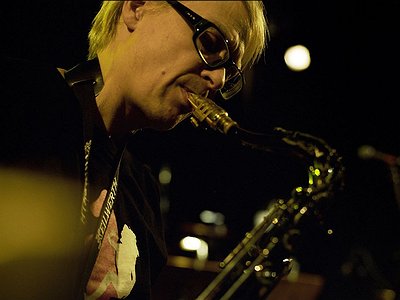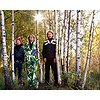Part 1
Name: Jimi Tenor
Nationality: Finnish
Occupation: Saxophonist, improviser, composer, producer
Current album: Electric Willow with Tenors of Kalma
Labels: Puu, Warp, Kindred Spirits
Bands: Tenors of Kalma, Soft Focus
Musical Recommendations: Count Ossie and the Mystic Revelation of Rastafari, The Boredoms.
When did you start playing your instrument, and what or who were your early passions or influences?
I started with the piano when I was 6. I wanted to play flute from the start, but during those days in Finland the feeling was that one needed to learn the piano first. Later on, at 14, I started to play sax at school. I was into The Doors, Iggy Pop, Jethro Tull and I was really into Finnish underground bands. Things would come and go. I would be obsessed by some artists for a while and then discover new things. I guess quite a typical story. I didn't really listen to jazz before I was older. A bit of an important event was visiting Cuba in 1983 and discovering [Chucho Valdés's band] Irakere. Those days Irakere was really happening.
For most artists, originality is first preceded by a phase of learning and, often, emulating others. What was this like for you? How would you describe your own development as an artist and the transition towards your own voice?
I guess when you're growing up you don't see it yourself so clearly that you're copying your favorite artists. For me it took a long time to find a personal voice. But I think nowadays I have something to say musically. At least when I'm attending jazz festivals, I can see that there's a huge lack of original ideas. For me it's not enough to deliver a standard set. I'd rather fail than not to try something a bit challenging.
Tell me about your instrument, please. How would you describe the relationship with it? What are its most important qualities and how do they influence the musical results – and possibly even your own performance?
Well, I play all sorts of instruments. I'm not that picky about my wind instruments. I play quite standard saxophones and flutes. I don't have a fetish towards them. I mean, of course the instruments have to be very good, as they're the ones I always play. But I don't have a special Selmer or Conn.
When it comes to synths, though, I'm a bit more particular. My absolute favorite is the Korg MS-20. It's a unique instrument. It's funny when I go somewhere far away to play and I ask them to bring me a Korg MS-20 to the stage and very many times they bring me a generic keyboard. For example a Nord Lead or Korg Trinitron. It's almost like you asked for a bassoon and they bring you a tin whistle. OK if you do electronic music venues in Europe, you will definitely get the MS20 and people know what it is. Many times it's the owner that brings it and we talk about the instrument. But in a jazz setting, forget it!
Many artists feel as though, at some point, certain people gave them the ”permission to do certain things”. How was that for you – in which way did the work of particular artists before you “allow” you to take decisions which were vital for your creative development?
I've mostly played in bands where we feel quite free doing whatever. I think it would be different if I had played as a sideman in some big artist's band for years and then wanted to continue my own route. But I don't have that experience. I've always done my own thing, sometimes more sometimes less successfully.
But I guess you're referring to the question whether I heard some music that opened my mind. The list would be so long ... but in a very practical way, Mika Vainio's first EPs were a big thing for me. They made me try to do something serious with my own home-recording equipment. That was a liberation for sure.
[Read our Mika Vainio interview]
What were some of your main artistic challenges when starting out as an artist and in which way have they changed over the years?
One of the big challenges was language. If I wanted to make music with vocals, the Finnish language could be a really limiting thing. Unless you do folk music of course. The way I have managed to by-pass that problem is that I do mostly instrumental music or sing in every 5th song or something. Working with Kabukabu guys has liberated me a little bit. After working with them I feel more comfortable singing more.
One big musical development has been that these days I'm OK with writing music for an orchestra or a big band. I had quite good music education, but for years and years I never wrote anything on paper. Then I started writing lines for horn sections, which slowly led to writing stuff for big band as well.
As a rule, though, I don't want to read on stage. I sometimes have small notes if the material is very complicated. It doesn't feel right.
What do improvisation and composition mean to you and what, to you, are their respective merits?
I really like improvisation. Free improvisation that is. I hate jam sessions, where people play standards and predictable grooves. I like to feel free on stage. Either I need to know the material very well or that the improvisation can be such that it allows you to feel free. I almost never ask the chords when I need to improvise. I'd rather listen to the "chordscape" so to speak and improvise by reacting to other players.
I try really hard to make my compositions very playable for musicians. I normally jam the idea for horn arrangements. That way, everything is playable and much more groovy than when you just write things on paper. That's my view at least.






